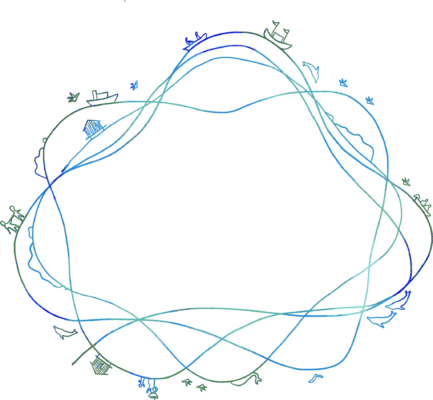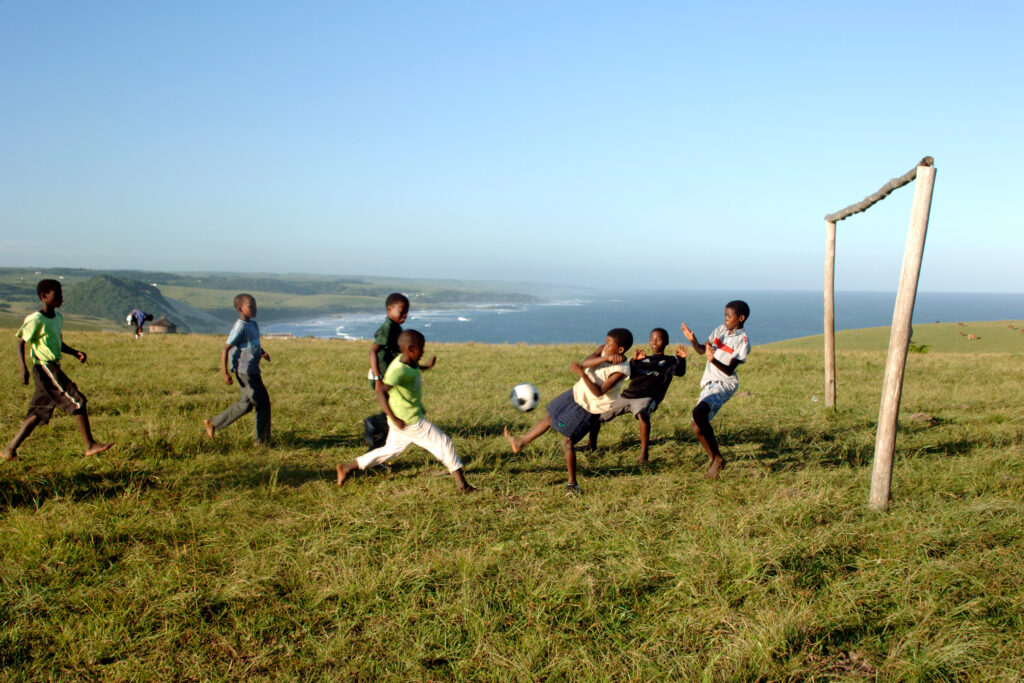Sailing to the Climate COP27

In 2021, the One Ocean Hub and partners participated and contributed towards “increasing visibility” of the ocean in climate dialogues at the Glasgow Climate COP26. We amplified voices of those who are marginalized from ocean-climate decision making process such as women, children, youth and small-scale fishers by sharing stories and experiences, lived realities, of the impacts of climate change and how this in turn impacts on their right to a healthy environment. COP27 is fast approaching (8-16 November 2022 in Egypt) and the Hub has been battening the hatches and setting sail to further advance ocean-climate dialogues, amplify voices and meaningfully contribute to co-producing pathways for resilience. Our first port of call was contributions made by Hub Director, Professor Elisa Morgera, and Hub Early Career Researcher, Mitchell Lennan (University of Strathclyde, UK) at the Bonn climate meeting in June 2022 (see here and here), in response to the invitation from the United Nations Framework Convention on Climate Change (UNFCCC) Secretariat to bring to the international level the voices of Indigenous and local people as part of an attempt to ‘blue’ Nationally Determined Contributions (NDCs) (see here and here).
Through all these engagements we have identified key inter-related messages that need to be carried over to COP27. First, we need meaningful co-production of ocean-based climate solutions, through transdisciplinary research for development, so that we can co-produce pathways and considerations required to equitably address climate change impacts on the ocean that sustains us all. As part of this approach, we need to raise the profile of human rights, particularly of Indigenous Peoples, local coastal communities, women, children and youth, through enabling direct contributions at COP27 and across scales. These messages have been shared at the next port of call on the way to COP27 – Africa Climate Week, that took place between 29 August and 1 September 2022 in Libreville, Gabon. Africa Climate Week, co-hosted by the UNFCCC Secretariat along with the Gabonese Republic, brought together a broad range of stakeholders to drive climate action across countries, communities, and economies.
Highlighting the importance of local knowledge and experience in ecosystem restoration
We co-organized to the ‘Ocean and Climate Action: Adaptation and Resilience Practices and Tools Clinic’ on 30 August 2022. This was a COP27 Virtual Ocean Pavilion live-event for Africa Climate Week, whichwas co-organised by the Global Ocean Forum and Plymouth Marine Laboratory. It served as an interactive training and experience-sharing session during which experts discuss innovative ocean-based climate change adaptation and mitigation initiatives with attendees. Lessons were identified and reviewed with the attendees, including possible pathways for improvement.
At the event, Hub Deputy Director Dr Bernadette Snow (University of Strathclyde, UK and Nelson Mandela University, South Africa) provided an overview of Hub research in Algoa Bay (South Africa), including restoration initiatives undertaken by colleagues at Nelson Mandela University. The process and considerations required for success of the ecosystem restoration include considering urban drainage systems, biomimicry, inclusive decision making and tools for monitoring. Dr Snow stressed that it is essential to take an inclusive approach when tackling climate change because inclusivity links to stewardship. Inclusion brings in lived realities and local solutions for climate change adaptation. It also enables different stakeholders to work together to foster resilience in the face of increased natural disasters. Dr Snow further noted that ecosystem restoration is an important approach to tackle climate change because ecosystems provide essential services, both at the local and global level. Many essential ecosystems such as rivers, estuaries, and coastlines are severely impacted by increasing urbanization, pollution, ecosystem destruction, thereby weakening natural protection against severe climate impacts. Restoring these ecosystems, builds resilience, and if designed right (collaboratively), tackles poverty and human health issues.
Key messages from Dr Snow through the presentation and engagement with audience at the event are:
- The climate-ocean nexus needs to be included in climate discussions, mitigation and adaptation strategies.
- Blue carbon habitats are essential. Restoration is the tool in the toolbox for climate change mitigation and to build resilience.
- It is important to bring in local knowledge and experience in ecosystem restoration processes
- Inclusive process is needed if we want to see the long-term benefits of ecosystem restoration, particularly to ensure the initiative can be useful for saving costs and mitigate damage.
- Human activities on land such as raw sewage discharge and plastic pollution bring about negative impacts on ocean health and negatively affected local communities who are most dependent on the ocean. This shows interconnection between land and ocean ecosystems and social and environmental impacts.
- A gap identified is that we need to strengthening uptake of how restoration can measurably contribute towards job creation by decision makers through policy frameworks.
The recording of the event can be accessed here.
Mainstreaming research co-production to introduce and transform nature-based solutions
Dr Bernadette Snow was invited by Mr James Grabert, Director of the Mitigation Division of the UNFCCC Secretariat and Lead of the Regional Climate Weeks to participate as a speaker in session 6 titled “Harnessing nature for transformative adaptation in Africa” on 31 August 2022. This session discussed the potential for nature-based solutions and their enabling environment in Africa in light of its anticipated benefits for transformative adaptation and long-term resilience.
At the event, Dr Snow explored how best can the gaps between research and practice for nature-based solutions be bridged to facilitate transformative adaptation and resilience in Africa. She also illustrated to what extent there are known limits to nature-based solutions and cost-benefit analyses, and what potential they have to inform the integration of nature-based solutions into planning and implementation.
Key messages from Dr Snow’s intervention and engagement with the audience are:
- We need to ensure that different knowledge systems are included in the research process to address gaps between research and practice for nature-based solutions.
- The co-production of research between researchers and stakeholders is the way to introduce and transform nature-based solutions.
- Co-production needs novel methodologies such as arts-based participatory methodologies, an innovative way for inclusion of stakeholders that are often marginalized in decision making process in climate adaptation and mitigation and for discovering new pathways to develop nature-based solutions.
- It is important to unpack the inherent and intangible value of nature to people that is often overlooked in discussion on climate resilience, adaptation, and mitigation.
The recording of the event can be accessed here (FR) and here (ENG).
Advancing children, youth, and small-scale fishers’ meaningful role in climate change adaptation and mitigation

In the run-up to COP27, the One Ocean Hub in collaboration with civil society and youth partners such as Sustainable Ocean Alliance, Global Youth Biodiversity Network, Oceanic Global, Peace Boat, and Terre des hommes are working together to highlight two key points:
- Children and young people should be the focus of ocean-based climate action and play a meaningful role in the national and international dialogues that shape the future of our ocean
- Traditional knowledge about the ocean and art can significantly contribute to empower children and youth.
As part of Children Rights Coalition Group, the Hub has supported two documents:
- A COP fit for Children: How to support children’s participation
- Incorporating Children’s Rights into Climate Action
The Hub also aims to connect the COP27 with the FAO’s International Years of Artisanal Fisheries and Aquaculture 2022 to underscore impacts of climate change on small-scale fishers (SSF)’ human rights and shed light on small-scale fishers’ insights on resilience and adaptation. In collaboration with partners such as the FAO, the UN Special Rapporteur on Human Rights and the Environment, the Office of the United Nations High Commissioner, and the WWF, the Hub draws attention on how adaptation and mitigation measures that are implemented with little to no consultation with small-scale fishers raise human rights problems in terms of fishers’ access to resources, food and nutrition security, livelihoods, and social justice.
We aim to continue the journey at COP27 and have applied with key strategic partners for different events in Egypt. The Hub already has an important partnership with the Virtual Ocean Pavilion (please register here to participate) and two confirmed events:
Ocean-Climate-Society: challenges & opportunities for ocean mitigation, adaptation, finance & UNFCCC (Blue Zone), 15th November 2022 at 16:45-18.15 (Egypt), Room 5, at COP27 Blue Zone, Egypt.
Led by Plymouth Marine Laboratory
Indigenous Knowledge, Community-based Art Practice and Inclusive Ocean Governance: A Case Study from Vanuatu, 15th, 16th or 17th November 2022, COP27 Moana Blue Pacific Pavilion in the Blue Zone, Egypt. Led by One Ocean Hub and Glasgow School of Arts
We have many others planned and will share these as they are approved. We invite contributions in strengthening our messages and your support as we sail to COP27. For more information contact Dr Senia Febrica.